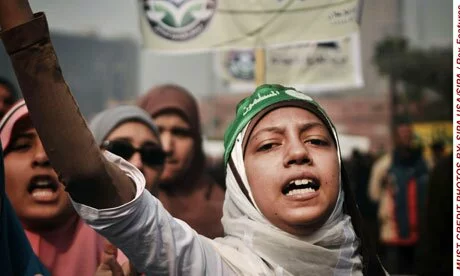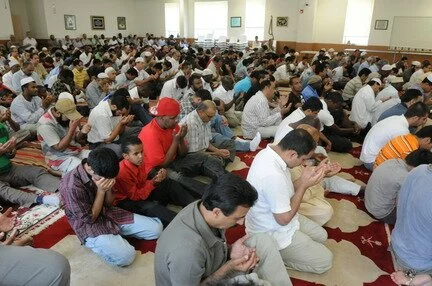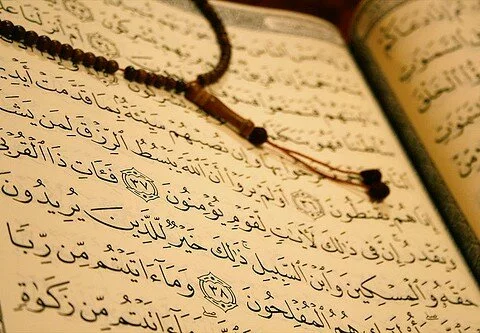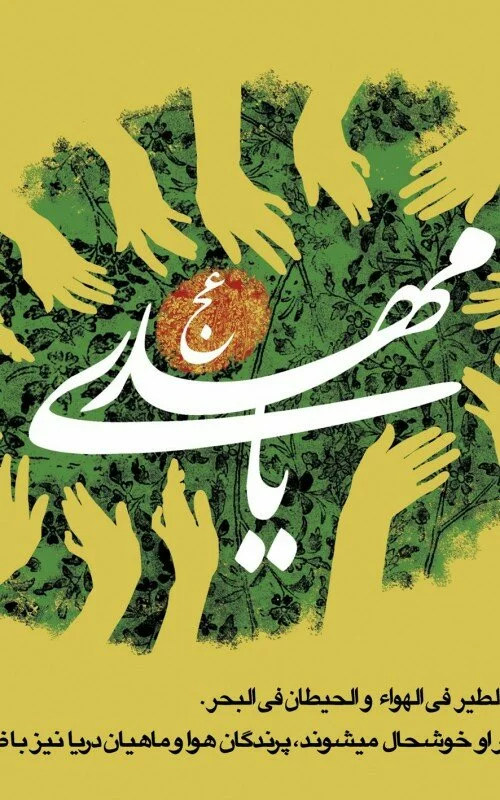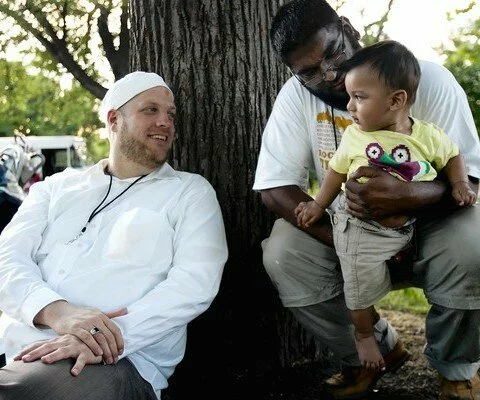
At the pulpit of an inner-city Chicago mosque, the tall blond imam begins preaching in his customary fashion, touching on the Los Angeles Lakers victory the night before, his own gang involvement as a teenager, a TV soap opera and then the Day of Judgment.
“Yesterday we watched the best of seven…. Unfortunately we forget the big final; it’s like that show ‘One Life to Live,’ ” Imam Suhaib Webb says as sleepy boys and young men come to attention in the back rows. “There’s no overtime, bro.”The sermon is typical of Webb, a charismatic Oklahoma-born convert to Islam with a growing following among American Muslims, especially the young. He sprinkles his public addresses with as many pop culture references as Koranic verses and sayings from the prophet. He says it helps him connect with his mainly U.S.-born flock.
“Are we going to reach them with an Arab message or with a Pakistani message? Or are we going to reach them with an American message?” asks Webb, 38, of Santa Clara. He is a resident scholar and educator with the Bay Area chapter of the nonprofit Muslim American Society, but reaches others in lectures and through his popular website, which he calls a “virtual mosque.”
Webb is at the forefront of a movement to create an American-style Islam, one that is true to the Koran and Islamic law but that reflects this country’s customs and culture. Known for his laid-back style, he has helped promote the idea that Islam is open to a modern American interpretation. At times, his approach seems almost sacrilegious.
Although the call to prayer at a mosque is always issued by a man, Webb once joked about it being made by one of his favorite female R&B artists: “If Mary J. Blige made the call to prayer, I’d go to the mosque; I’d be in the front row.”
At a Muslim conference in Long Beach last year, he suggested that mosques adopt a “don’t ask, don’t tell” policy toward gays. Afterward, he was accosted by a local imam who accused him of poisoning Muslim youth. “I told him, ‘Quite frankly, you’re going to be irrelevant in 10 years,’ ” Webb says.
He is fluent in Arabic, the language of the Koran, and studied for six years at one of the world’s leading Islamic institutes, Egypt’s Al-Azhar University. His time in the Middle East convinced him that not all religious practices there make sense for Muslims here.
As recently as a decade ago, U.S. congregations readily accepted immigrant imams who had arrived straight from Islamic universities, often with a traditional approach to preaching. Many spoke little English and were unable to communicate with non-Arab congregants or connect easily with youth.
But increasingly, U.S. Muslims expect their religious leaders to play a broader, more pastoral role, says Hossam Aljabri, executive director of the Muslim American Society, a national religious and education group. “Communities want imams who can come in and go beyond leading the prayer and reading Koran. They want them to fill the social role of counseling and dealing with neighbors.”
Religious scholars say the faith’s basic tenets would not change but much of the law that governs Islam may be interpreted differently in various communities.
Webb believes, for example, that barriers between men and women in U.S. mosques are not necessary, although they continue to be used in many traditional congregations. Unlike some imams, he does not object to music and believes Muslims here should be free to celebrate such secular holidays as Mother’s Day and Thanksgiving.
But given the ethnic diversity of U.S. Muslims, finding a consensus for a single American Islam could be difficult. Some favor major reforms that would alter the faith’s core beliefs. Others oppose any change.
In 2007, Webb stopped teaching at SunniPath, an online academy of traditional Islamic education, tussling verbally in the process with a few of its scholars, who are critical of what they term “modernist Islam.”
“Modernists are doing a disservice to Islam…. They validate things that are slack in Islamic practice,” Sheikh Nuh Keller, a teacher at the academy, said at the time. “We say to the modernists, nothing needs to be modernized.”
Although Webb has spent much of his time in Egypt in recent years, his U.S. following has grown. His website, where he posts writings on such topics as relationships, personal development and Islamic studies, gets more than 10,000 visitors a day, and sparks extended conversations.
In November, one reader asked if it was OK for Muslims to celebrate Thanksgiving. Webb’s response that the holiday was allowed upset some who thought that could lead to more questionable practices.
“Soon it will be [permissible] for me to take that ‘Santa Claus’ gig at the mall…….or it is already????” asked one commenter, Ahmed.
Others appeared to appreciate Webb’s effort to balance Muslim teachings with life in the West.
“We prefer to dismiss all culture as the antithesis to Islam,” wrote Tricia. “We lack … indigenous scholars who can give us a refined view of culture that distinguishes blameworthy from admirable cultural practices.”
Imams need to be culturally relevant, Webb says. When young men ask his advice on becoming religious leaders themselves, he tells them, “Go watch ‘Nick at Nite’ for a year.”
“He’s the most approachable imam in the U.S.,” says Nour Mattar, founder of the country’s first Muslim radio station. “And he’s not boring to listen to, that’s huge.”
Christened William by his parents, Webb grew up in the Oklahoma City suburb of Edmond. His father, David, is a professor of American history at a local college, and his mother, Mary Lynn, worked as a human resources director.
Webb attended a local Church of Christ twice a week throughout childhood. “In my family, on your birthday you got a Bible with your name on it,” he says. But even at a young age, he questioned some Christian beliefs, including the Trinity.
When he was a teenager, he and several friends became immersed in a burgeoning hip-hop scene. After the others joined a local street gang, Webb, then 17, did too.
But his participation in the Bloods Pomona 456 was relatively minor, he says. He didn’t sell drugs and mostly hung out with other members looking for fights; at 19, he spent a week in jail for stealing hubcaps. In one serious incident, Webb says, he was the driver in a drive-by shooting, although no one was hurt or charged with a crime.
His teenage time in the gang and as a DJ at house parties figure prominently in his speeches and public persona, as a way to gain traction with young Muslims. That appears to work, at least with some. After his sermon in Chicago, a boy of about 12 turned to his mother, asking, “Did you hear his speech? He said he’s from the ‘hood.”
Webb was introduced to Islam at 19. He was selling music tapes at a swap meet when he met a Muslim man selling incense and handing out Korans. Webb took one home and read it in secret for several months.
He converted during his freshman year at the University of Central Oklahoma and broke the news to his parents at Thanksgiving dinner that year — when his mother had cooked a turkey and a ham, the latter forbidden by Islam.
Mary Lynn Webb says she was not happy at the time about her son’s conversion, but is pleased today when she sees him preaching to eager audiences. “I’m proud of him. It’s amazing, really, when you think that he doesn’t have that background” in Islam, she says. “I think it may have saved him from something had he stayed in the rap world.”
In college, Webb met Asma Ayoub, a Muslim Malaysian immigrant who was studying anthropology. They married in 2000 and have two children. Webb calls his wife his “greatest teacher.”
As he worked toward his bachelor’s degree in education, he also studied intensively with a local Muslim scholar. He later became imam of the Islamic Society of Greater Oklahoma City before moving to Santa Clara in 2002 at the behest of the Muslim American Society there.
The group sponsored Webb’s formal Islamic education at Cairo’s Al-Azhar. He returned to the Bay Area full time last summer.
Since then, he has worked on an educational curriculum that will focus on the experiences of young Muslims in the West. He is contemplating turning it into his own institute.
Webb hosted a town hall on his website last year where Muslim leaders debated the issue of youth radicalization. He reposted it during recent congressional hearings by Rep. Peter King (R-N.Y.) on militancy among U.S. Muslims.
But only rarely is Webb approached, he says — in person or by email — by anyone tempted by calls to violence from extremists. Young Muslims more often ask him about Darwinism or student loans.
When he does get such questions, he directs the youth to what he says their true jihad should be, including assimilating into American society and supporting their families.
“You see people who come to listen to him that wouldn’t listen to anyone else … people they were never able to reach out to,” says Imam Khalid Latif, Muslim chaplain at New York University.
On a hot day last year, Webb walked into Chicago’s Marquette Park, where dozens of artists were gathered for a Muslim music festival. He had been invited to speak and felt it was a good way to ease back into U.S. culture after his time away.
“I don’t think you’ll have a lot of clerics showing up here,” he said. “I know I’m going to see some things I’m not going to like.”
The festival was a departure from another conference he had just attended, where most women wore the hijab and the audience was divided into sections — for women, men and families. At this one, called “Takin’ It to the Streets,” women in shorts, tank tops and tattoos mingled with men in traditional robes. During the headlining performance by Grammy-nominated rapper Mos Def, Webb watched as couples danced and people near him smoked pot.
As he walked among the stages and booths, he was stopped often by admirers — at 6-feet-4, the blue-eyed imam stands out at Muslim events. Some asked for on-the-spot advice, as if he were a walking confessional: What should I do about this guy I broke up with? Where should I study Arabic? Is what I’m doing as a Muslim rapper OK?
Rami Nashashibi, executive director of the Inner-City Muslim Action Network, the event’s organizer, said not many scholars would accept the group’s invitation.
“It means a lot when people who represent scholarship and … authenticity within the Muslim community are present,” he said. “Even though they are not necessarily saying, ‘I condone wholesale what’s going on.’”
After Mos Def’s performance, Webb hugged him, saying, “Don’t let the community make you feel guilty about what you do.”
“Man, thanks,” said the rapper, a convert to Islam.
But for some, even this imam, despite his talk of gang life and near-encyclopedic knowledge of rappers, is too conservative. His invitation to the festival stemmed from a heated discussion on his website about the negative influences of Muslim hip-hop. Some artists initially had mixed feelings about his attendance.
And that is the challenge Webb faces, Nashashibi says. “He is trying to speak to multiple audiences in what is perhaps the most diverse subsection of the Muslim community across the world.”
After the panel, a man handed Webb a flier for a party after the festival.
“I can’t go to that; smoking weed, dancing with girls and wet T-shirt contests,” the imam said of the event, which promised none of that. He added with a grin, “I gotta draw the line somewhere.”
[email protected]
Source: http://www.latimes.com

